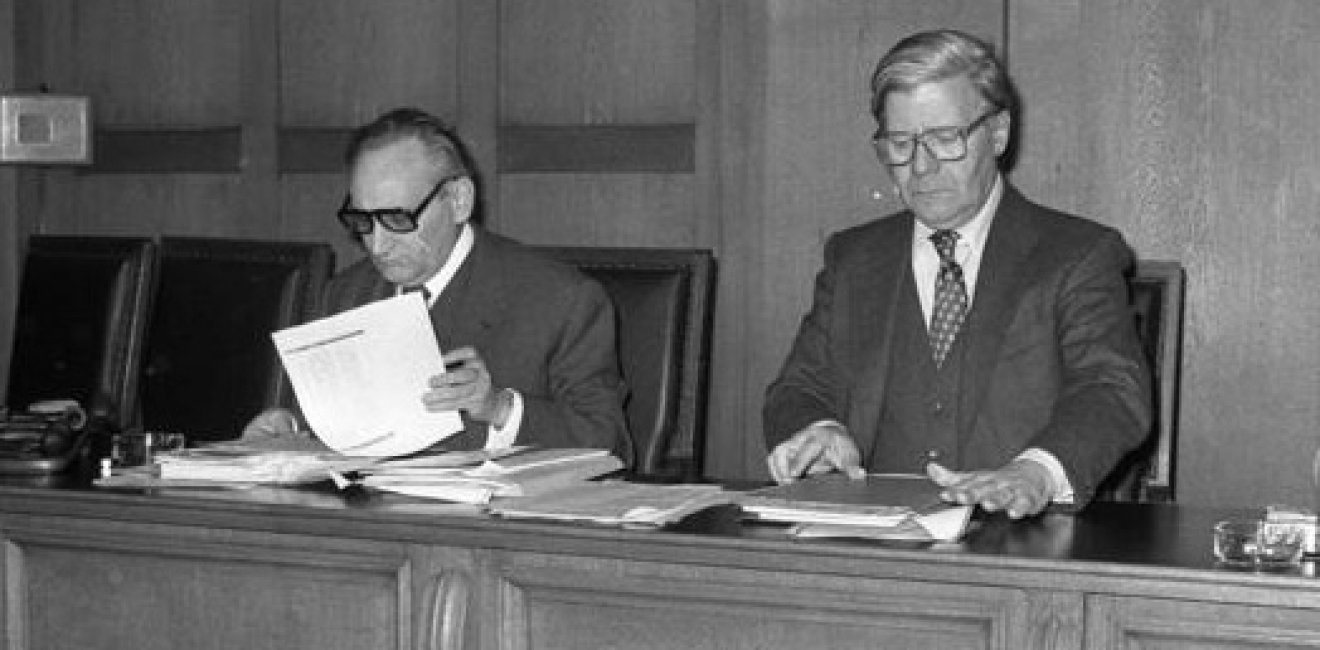The Secret Side of Ostpolitik
Helmut Schmidt, Egon Bahr, and the Soviet Backchannel

A blog of the History and Public Policy Program
Helmut Schmidt, Egon Bahr, and the Soviet Backchannel

Helmut Schmidt, Egon Bahr, and the Soviet Backchannel
Helmut Schmidt and Egon Bahr made pivotal contributions to the Federal Republic of Germany’s foreign policy. Bahr was the architect of Chancellor Willy Brandt’s Ostpolitik, and Schmidt managed to foster détente with the Soviet Union against the background of the Euromissile crisis. Both left a trove of personal papers. Schmidt’s files are deposited at his private archives in Hamburg as well as at the Archiv für soziale Demokratie (AdsD) in Bonn, which also houses Bahr’s papers.
Both Schmidt and Bahr believed in the virtue of adept personal diplomacy. When Schmidt assumed the Chancellorship in 1974, he authorized Bahr to maintain a secret line of communication with the Soviet leadership that Brandt and Bahr had established in 1969. Its significance and utility rivaled the Kissinger-Dobrynin channel. Yet Schmidt’s and Bahr’s papers are under-utilized in comparison to Kissinger’s sources, and their backchannel diplomacy is under-studied.
Schmidt’s and Brezhnev’s relationship was a success story of adversarial cooperation. They formed a partnership in security despite recurring military and political crisis. Their backchannel contacts catalyzed pan-European energy cooperation initiatives. Schmidt’s goal was to engage the Soviet Union in a joint perspective of trade, industry and technology over the next 20 to 30 years within which would emerge a greater Soviet dependence upon European supplies. Schmidt’s rationale was that this would result in more European influence on Soviet policies. The conclusion of the bold economic framework treaty with the Soviet Union in 1978 was the epitome of this approach. Its long-term perspective of 25 years gave the rigid Soviet planning system time to accommodate to the needs of intensified pan-European energy cooperation. It was the precondition for the significant expansion of the gas and pipeline business in the 1980s.
The German-Soviet backchannel originated from a meeting between Bahr and Valeri Lednev on Christmas Eve 1969. Lednev worked under the cover of a journalist for "Sovietska kultura", and Bahr met him for what was set up as a routine interview. Lednev lifted his cover when he referred to the top-secret letter that Chancellor Brandt had sent to Soviet Prime Minister Kossygin back in November 1969: Brandt had indicated his readiness for direct and confidential dialogue, and here came Lednev to signal the Soviet leadership’s willingness to initiate it right away. As things turned out, Bahr and Lednev remained backchannel partners over the next 13 years, until the demise of the social-liberal coalition government in October 1982. In autumn 1982, Bahr handed the backchannel contact to Helmut Kohl and his foreign policy adviser Horst Teltschik.
Lednev’s cover as a journalist enabled him to travel and to see Bahr in Bonn. In Bahr’s presence, Lednev even visited Helmut Schmidt at his home in Hamburg Langenhorn or at his vacation refuge on the Brahmsee. Meetings also took place in West Berlin and Moscow.
Bahr used these occasions to see both Lednev and his superior, KGB General Vjačeslav Kevorkov. This line of communication extended all the way to the top—KGB Chairman Yuri Andropov was the driving force behind the improvement of relations with the Federal Republic and personally oversaw Lednev’s and Kevorkov’s backchannel diplomacy. Published in German, Kevorkov’s memoirs provide a vivid account on Andropov’s tireless efforts to sell the gains of détente in the CPSU’s Politburo trying to convince the hardliners.
Early on, the backchannel was invaluable—it provided Bahr with the authentic insight into Soviet decision-making that was necessary for Ostpolitik’s rapid success. The talks were the precondition for the speedy conclusion of the Moscow Treaty in August 1970.
Unfortunately, Bahr merely kept occasional notes during Brandt’s tenure. Brandt and Bahr were personal friends, and Bahr used to inform Brandt through oral reports. But as Bahr pointed out in his memoirs, things changed in 1974 when Helmut Schmidt took over: Schmidt wanted written reports. About 150 reports pertaining to the backchannel meetings exist, stored in Schmidt’s five personal Soviet Union files (Archiv Helmut Schmidt Hamburg, Soviet Union, Vol. 1-5). The papers are stored at Schmidt’s estate in Hamburg, and the Helmut and Loki Schmidt Foundation governs the use of the collection. Bahr’s backchannel evidence is part of his L(ednev) files in the papers on “Deutschland- und Ostpolitik” at the Archiv für soziale Demokratie in Bonn.
One of the most fascinating aspects of Bahr’s backchannel meetings is their increasing frequency against the background of the Euromissile crisis and the Soviet intervention in Afghanistan. Dialogue often tended to wane in crisis moments. Helmut Schmidt believed that it should be the other way around.
Increased tensions necessitated more dialogue: In 1978, 1980, and 1981, Schmidt and Brezhnev had three productive summit meetings. Their objective was to maintain the benefits of détente and to protect them against spillover effects from the Euromissile crisis. Preparatory efforts for all summits took place through the backchannel.
The evidence in Schmidt’s and Bahr’s papers also provides new information pertaining to the search for pan-European energy projects, which were seen as the most promising way to maintain a long détente in Europe. The Moscow Summit in 1980 paved the way for the construction of the single biggest pipeline for the transport of natural gas from the Soviet Union to Western Europe, despite the intermittent freeze in US-Soviet relations.
Schmidt’s and Bahr’s papers are unique sources that give a direct and unfiltered view on confidential talks that profoundly transformed the Federal Republic’s relations with the Soviet Union in a pivotal period of contemporary history. They demystify the conduct of backchannel diplomacy: It’s not about tricky games, it’s tedious work with lasting effect, and it’s all about trust building.


A leader in making key foreign policy records accessible and fostering informed scholarship, analysis, and discussion on international affairs, past and present. Read more


The Cold War International History Project supports the full and prompt release of historical materials by governments on all sides of the Cold War. Read more



